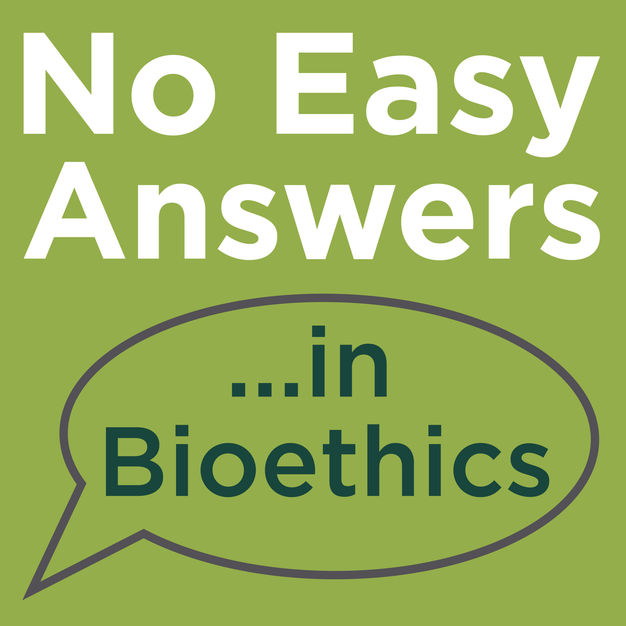
Bio-Ethics Bites
Bioethics is the study of the moral implications of new and emerging medical technologies and looks to answer questions such as selling organs, euthanasia and whether should we clone people. The series consists of a series of interviews by leading bioethics academics and is aimed at individuals looking to explore often difficult and confusing questions surrounding medical ethics. The series lays out the issue in a clear and precise way and looks to show all sides of the debate.
- 19 minutes 47 secondsNeuroscience Can Tell Us About MoralityWhat can science tell us about morality? Many philosophers would say, 'nothing at all'. Facts don't imply values, they say. you need further argument to move from facts about us and about the world to conclusions about what we ought to do. For example, most humans are altruistic - they genuinely care about the well-being of friends and family and to a lesser extent even of strangers - they'll give money to charity to help people they've never even met. Suppose science gives us a compelling scientific explanation for why we're altruistic. Does that tell us whether we should be altruistic?3 February 2012, 11:25 am
- 16 minutes 48 secondsBrain Chemistry and Moral Decision-MakingAnswers to moral questions, it seems, depend on how much serotonin there is flowing through your brain. In the future might we be able to alter people's moral behaviour with concoctions of chemicals? A train is hurtling towards five people; it's out of control. You are standing on a footbridge, standing next to a very obese man. The only way to save the five is to push the man over the footbridge to his certain death: his bulk would stop the train and save five lives. Should you do it? Should you give him a shove? Most people would say no. Utilitarians say yes, you should take one life to save five. Now it turns out that the answer you give will depend on how much serotonin there is flowing through your brain. This raises an intriguing possibility: in the future might we be able to alter people's moral behaviour with concoctions of chemicals? That's been the research focus of Molly Crockett, now based in Zurich, but formerly of Cambridge University4 January 2012, 12:32 pm
- 16 minutes 3 secondsResponsibilityIf someone caught me shoplifting, and I was later diagnosed with kleptomania, should I be held responsible? Should I be blamed? There's a growing body of knowledge in psychiatry and neuroscience about why people think and behave the way they do. And according to one school of thought, as our knowledge expands, so the space for responsibility contracts. Hanna Pickard is not from that school. She believes we can, at one and the same time, diagnose a disorder and hold the person with that disorder responsible. Dr. Hanna Pickard is an Oxford based philosopher and therapist, and the holder of a Wellcome Trust fellowship examining the nature of responsibility and morality within personality disorder.1 December 2011, 9:45 am
- 18 minutes 18 secondsSelling OrgansEveryday people die in hospitals because there aren't enough organs available for transplant. In most countries of the world - though not all - it is illegal to sell organs. Governments insist that the motive for donating organs has to be altruistic, it can't be financial reward. The idea of being able to sell body parts makes many people uneasy. But is it time for a policy change: should we be permitted to flog one of our kidneys on ebay, say, for $10,000. If not, why not? Tim Lewens is a Cambridge philosopher and a member of the Nuffield Council on Bioethics.1 November 2011, 12:15 pm
- 20 minutes 2 secondsBio-Ethics BitesDemand for health care is infinite, but money is finite. So how should we distribute resources? Whom should we help, and why?3 October 2011, 11:59 am
- 18 minutes 13 secondsTrustRadically new techniques are opening up exciting possibilities for those working in health care - for psychiatrists, doctors, surgeons; the option to clone human beings, to give just one example. Who should determine what is allowed and what prohibited? And what sort of consent should doctors have to have from patients before treatment. Is the trend towards consent forms helpful? Or should we trust doctors to make good decisions for us. For many years now, philosopher Onora O'neill, formerly principal of Newnham College, Cambridge, has been thinking about the issue of 'trust': trust is vital in most areas of human interaction - but nowhere more so than in health and medicine.1 September 2011, 10:52 am
- 19 minutes 17 secondsStatus Quo BiasSuppose a genetic engineering breakthrough made it simple, safe and cheap to increase people's intelligence. Nonetheless, if you asked the averagely-intelligent person on the Clapham Omnibus whether we should tamper with our genes to boost our brains, he or she might recoil at the notion. Nick Bostrom, director of the Future of Humanity Institute at Oxford University, suspects that this reaction may be a result of what he calls 'status-quo bias'.1 August 2011, 12:21 pm
- 16 minutes 17 secondsLife and DeathIf a patient decides she doesn't want to live any longer, should she be allowed to die? Should she be allowed to kill herself? If a patient is in no position to decide - perhaps she's in a coma - then should somebody else be able to decide to kill her? Who? Is there a moral difference between killing and allowing someone to die? And is the role of the doctor always to prolong life? Peter Singer, of Princeton University, is one of the world's leading bio-ethicists, and has been reflecting on life and death issues for four decades.4 July 2011, 1:01 pm
- 18 minutes 54 secondsMoral StatusA stone on the beach, we assume, has no moral status. We can kick or hammer the stone, and we have done the stone no harm. Typical adult human beings do have moral status. We shouldn't, without a very good reason, kick a man or woman. Often, contentious moral issues, such as embryo research, or abortion, or whether to turn off a life-support machine, turn on disagreement about moral status. So the key questions are, who or what has moral status, and why? Jeff McMahan, of Rutgers University, has spent years trying to unravel the answers.31 May 2011, 8:32 pm
- 21 minutes 21 secondsDesigner BabiesThe term 'designer baby' is usually used in a pejorative sense - to conjure up some dystopian Brave New World. There are already ways to affect what kind of children you have - most obviously by choosing the partner to have them with. But there are others too: a pregnant mother can improve her baby's prospects by not smoking, for instance. With advances in genetics, however, there will soon be radical new methods to select or influence the characteristics of your progeny: not just physical characteristics, like height or eye colour, but intellectual capacities, and capacities linked to morality - such as how empathetic the child will be. The big question is how much freedom parents should have to make such selections. Julian Savulescu of Oxford's Uehiro Centre for Practical Ethics, believes that if we can genetically alter the next generation, not only should we be free to do so, it may even turn out that in some circumstances we have an obligation to go ahead and so it.31 May 2011, 8:29 pm
- More Episodes? Get the App
Your feedback is valuable to us. Should you encounter any bugs, glitches, lack of functionality or other problems, please email us on [email protected] or join Moon.FM Telegram Group where you can talk directly to the dev team who are happy to answer any queries.
 Bioethics on Air
Bioethics on Air
 Ethically Sound
Ethically Sound
 No Easy Answers in Bioethics
No Easy Answers in Bioethics
 Ethics Bites - Audio
Ethics Bites - Audio
 Medical Ethics
Medical Ethics